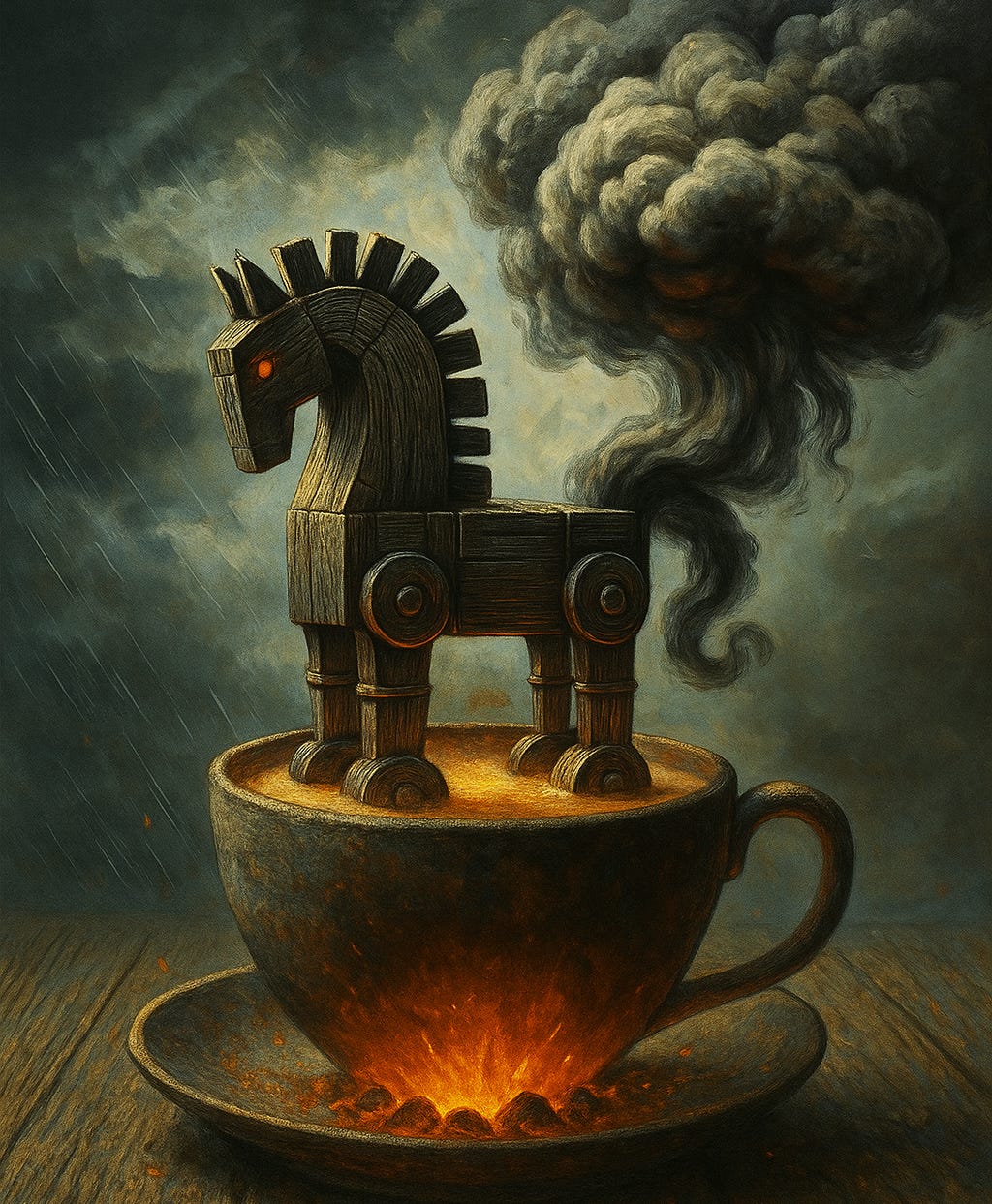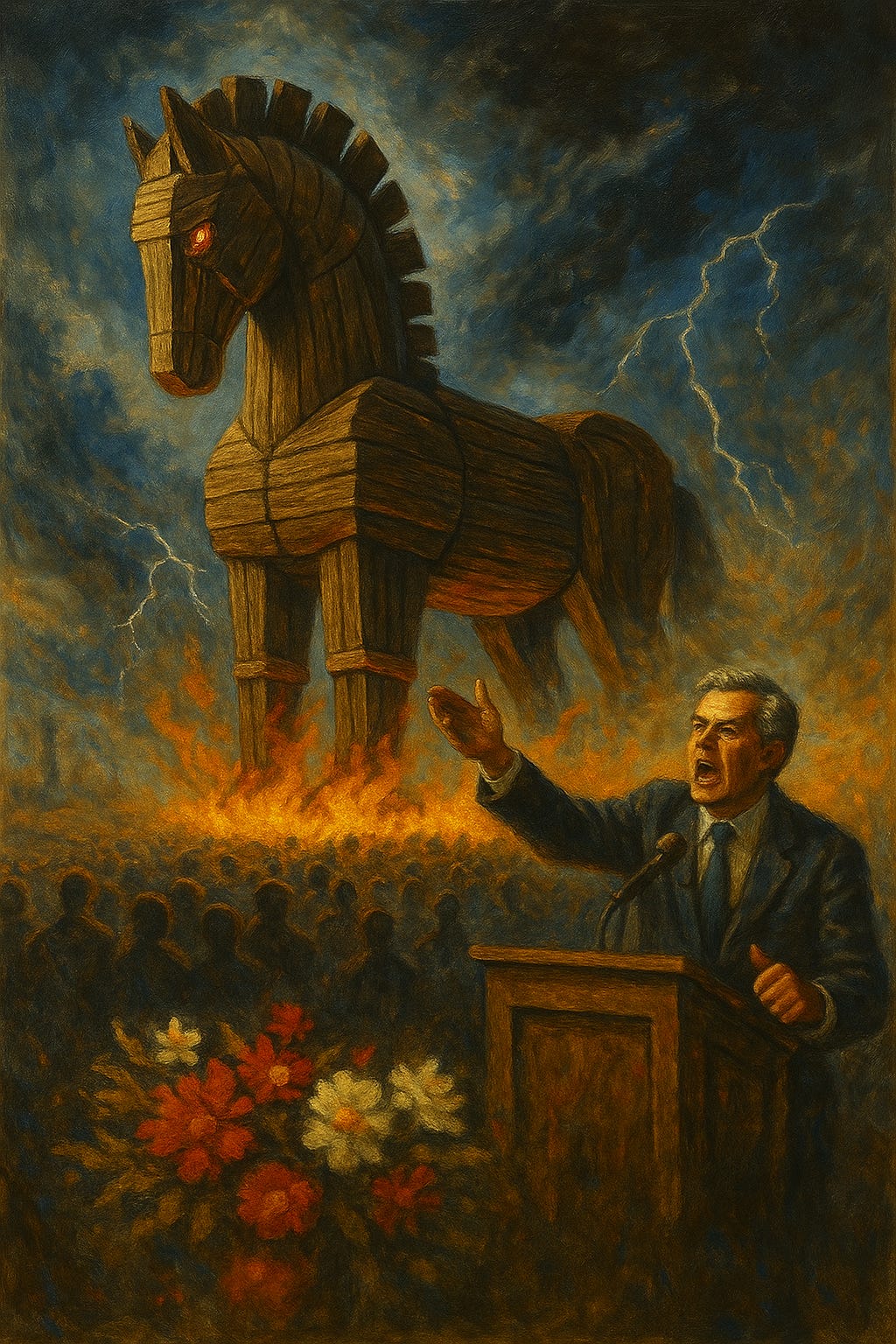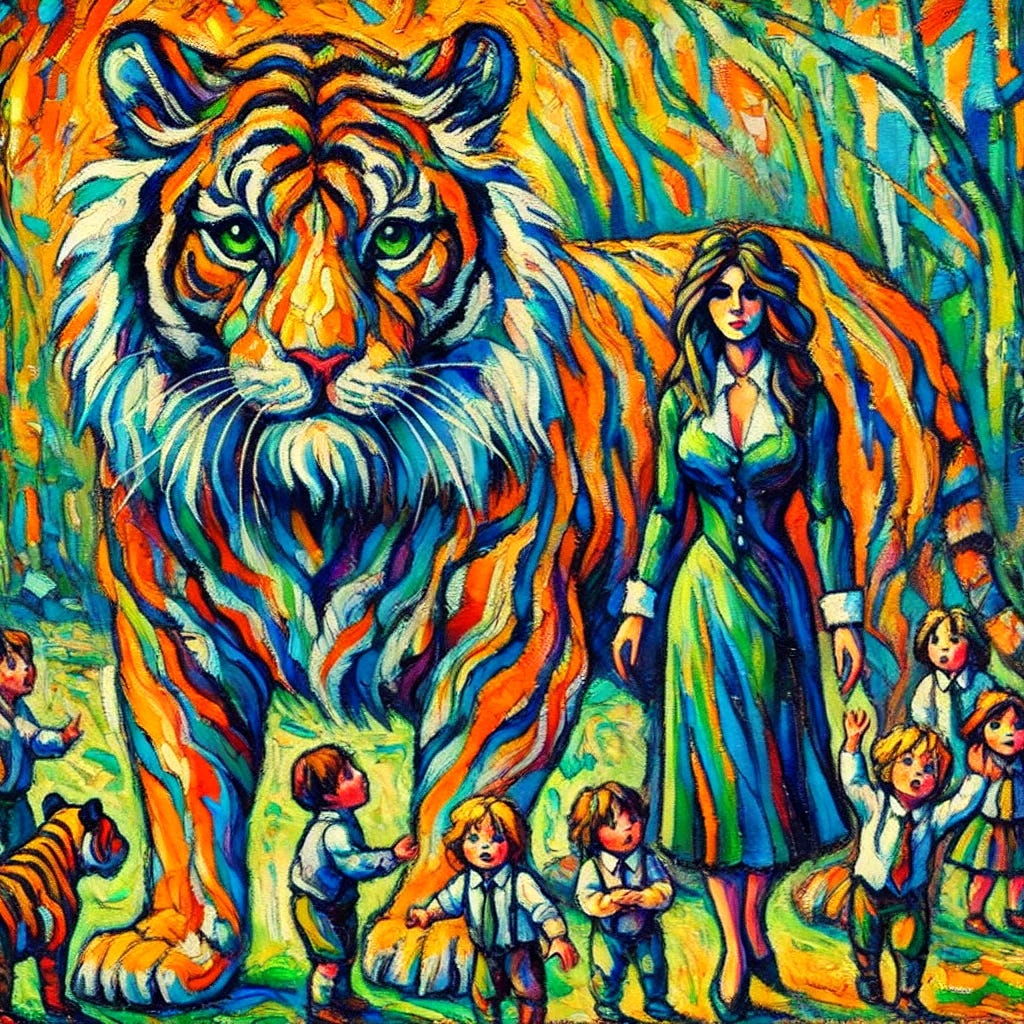Cut Flowers on the Last Trojan Horse
Why the West clutches its bouquets while the rot spreads from within
They say it’s “just the price of a coffee.” Spare me. You already have too much caffeine in your bloodstream. What you don’t have is enough fearless prose that refuses to grovel before the cult of feelings. For $6 a month, less than USD $4, you can remedy that.
But I only ask that when you choose your coffee, please choose mine. Cheers.
This is a song I wrote to go with it. Adding a song with AI (my lyrics) to an essay is a bit odd, but I have never claimed to be normal. Drake should not fear me.
The great civilisations of history rarely collapse due to a single mighty blow from outside. Barbarians at the gate are usually the undertakers, not the killers.
What kills a civilisation is the dry rot within its beams, the termites gnawing unseen at the joists, while its leaders hold parades, give speeches, and tell themselves the marble pillars will stand forever.
The Greeks at Troy, the Roman Senate, and—God help us—the Canadian Prime Minister at a Taylor Swift concert all teach the same lesson: collapse is, above all, an inside job.
We are warned about this in stories we half-remember from high school.
The Trojan horse rolled through the gates by leaders convinced it was a divine gift. Cassandra shrieking in futility, Laocoön was strangled for telling the truth. The Trojans were undone not by Greek brilliance but by their own hubris, credulity, and the irresistible temptation to have one more feast before bedtime.
Rome gave us the other parable. Julius Caesar didn’t destroy the Republic; it had already destroyed itself. Senators too cowardly to govern, too corrupt to reform, too addicted to their own inertia, stabbed Caesar in the name of liberty and succeeded only in opening the sluice gate to autocracy. The knives went into Caesar’s back, but the Republic had slit its own throat decades earlier.
And then there is the Norwegian fairy tale East of the Sun and West of the Moon. A poor peasant girl is given to a great white bear, who spirits her away to a distant castle. At night, a man comes to her bed, but she cannot see his face. When she finally lights a candle, she discovers the truth: the bear is a handsome prince under a curse. By breaking the taboo of looking, she condemns him to be whisked away to marry a troll princess in a castle “east of the sun and west of the moon.” What follows is a perilous and arduous journey. The girl, through grit, magical gifts, and sheer endurance, defeats the trolls and frees her prince. The bear is no longer a beast; the spell is broken.
It is a tale of endurance and redemption, but perhaps also the ancestor of a very modern superstition: the conviction that all wild animals have tender, misunderstood hearts. Thus, we get the melancholy headlines about those who raise tigers, lions, or pit bulls from infancy and assure the neighbours that the beast has become a family member—until one grey Tuesday when the “good heart” reverts to type and mauls them. Fairy tales promised transformation; nature, alas, keeps its own counsel.
It is a fine piece of folklore: redemptive, hopeful, a Scandinavian moral that says perseverance and purity of heart can transform even the monstrous into the noble. Children hear it and sleep well, assured that even beasts can turn into men, and trolls can be overcome by pluck.
But this, precisely, is the fairy tale that the West has chosen to believe as literal politics. That bears can and do become princes if only you love them long enough, tolerate them endlessly, and sprinkle a little liberal fairy dust. That hostile creeds, once steeped in the warm bath of Canadian politeness, will slough off their teeth and claws and emerge as ardent fans of multiculturalism. That the trolls at the gate are merely misunderstood houseguests, waiting for us to bring them inside.
It is touching, naïve, and lethal. Because, unlike the fairy tale, reality is not enchanted. Bears remain bears. Trolls do not melt into thin air. And when you light the candle and look closely at what they believe, what they say, and what they intend, you do not find a prince longing to be free—you find exactly what the prophets and ideologues said you would find.
And now—enter, stage left—the West. A civilisation with higher GDP, better medicine, and infinitely more screen time than Troy or Rome ever enjoyed, but just as prone to vanity, cowardice, and delusion.
Our Trojan horses now arrive not on wheels but in hashtags and HR policy manuals. Our Caesars are not generals with legions but bureaucrats with tribunals. And still, we cannot see that the worst enemy already has a desk on campus and a seat on the diversity committee.
The Western Problem: Mistaking Suicide for Virtue
The contemporary West—Canada, the United States, the UK, Europe, and the satellite islands of Australia and New Zealand—has become fatally confused about what constitutes virtue. We pride ourselves on diversity, tolerance, and pluralism as if repeating the catechism could ward off the inconvenient truth that not all cultures want to play the same game.
We cling to the comforting fiction that all people, once subjected to the gentle conditioning of Netflix, pronouns, and an occasional Pride parade, emerge from the kiln of humanity as identical Western liberals. This is touching, like believing in the Tooth Fairy, but infinitely more dangerous.
So when our enemies tell us they want Jews dead, or gays flogged, or Christians silenced, our response is not horror but a simpering “what have we done to make them feel this way?”
If some Moroccan youths roam Amsterdam hunting Jews with the efficiency of a Gestapo checkpoint, the Dutch liberal reflex is to assume they were not hugged enough.
If Canadian campuses erupt in pro-Hamas vandalism, our Prime Minister does not rouse himself from Taylor Swift’s friendship-bracelet exchange to notice. And Carney is simply Trudeau with better diction, but the same hubris.
Carney declares that Muslim values are Canadian values. No, sir—they are not. That may win you applause lines and perhaps some votes, but it is not true.
Many Muslims in practice may harbour no hostility toward our civilisation, and many live peaceably within it. But the values enshrined in the scripture to which they pledge fidelity are not Canadian. To claim otherwise is not just wrong—it is a dangerous lie.
Worse still: those Moroccan Jew-hunters were not fresh arrivals still smelling of the boat. They were second and third generation—meaning that exposure to Dutch liberty had not softened their edges but sharpened them into a purer, angrier fundamentalism. Assimilation, it turns out, is not magic dust sprinkled at the border. Sometimes it is gasoline poured on already smouldering coals.
Christopher Hitchens once said, “The essence of the independent mind lies not in what it thinks, but in how it thinks.” But the modern West no longer thinks—it emotes. And its chief emotion is guilt.
Cultural Relativism: When All Values Are Equal, None Are
Western elites still cling to the soporific idea that when a Muslim blows himself up in the name of Islam, he is somehow “not a true Muslim.” This is theology by NPR pledge drive, not analysis. Islam, like every religion, contains multitudes. To deny that some of those multitudes are murderous is not merely dishonest; it is suicidal.
The Medina Muslims—the followers of the Prophet in his second, more militarised incarnation—are not fringe weirdos. They are mainstream in swathes of the Islamic world. Pew Research tells us that in South Asia, 84% of Muslims want Sharia law. In the Middle East and North Africa, the rate is 74%. These are not extremists; these are majorities.
And yet, Western liberals, wrapped in the soggy blanket of cultural relativism, insist that any difficulty lies not in doctrine but in us. If Muslims oppose homosexuality, it must be because of colonial trauma. If Hamas quotes scripture while butchering civilians, it is because Israel provoked them. This is not analysis but masochism—masquerading as empathy.
As Sam Harris observed, relativism is “the soft bigotry of low expectations.” And indeed, it is bigotry—because it denies agency. The West infantilises those who despise it, imagining that a stern talking-to and a TED Talk on empathy will turn bears into princes. But bears, unlike Norwegian fairy tales, do not become princes.
The Reformation That Never Came
Christianity, to its credit—or perhaps thanks to its exhaustion—underwent a Reformation. The blood of martyrs, the flames of heretics, and finally the telescope and microscope forced it into a long retreat from power. By the time of the Enlightenment, Christianity had lost its monopoly on truth, and the world was better for it.
Islam has never endured that humiliation. And when reformers like Ayaan Hirsi Ali try, they are not merely opposed by Islamists but also by Western liberals who insist the White Bear must secretly be a prince. Ali, who fled Somalia, endured the Muslim Brotherhood, and now requires bodyguards, has no patience for this fairy tale. Death threats have a way of clarifying the mind.
A War of Ideas, Not Just Borders
The Middle East’s tragedy is not, at root, about land. It is about ideas—about whether religion is also a constitution and whether war is a permanent sacrament. The Medina model of Muhammad’s life is the charter document for Hamas, ISIS, and the Taliban. Pretending otherwise is cowardice.
And cowardice has consequences. While Russia runs its FSB disinformation playbook, China executes its long-game Belt and Road project, and Islamists burrow through Western institutions, our leaders hold diversity workshops and worry about microaggressions. The wolves are not merely at the door; they have tenure.
The Western Academy: Death by Platitude
My own university, the University of Guelph-Humber, has gone one better: it has aligned itself with an open anti-Semite who dreams of Israel’s annihilation, gloats over Jewish suffering, and embraces Medina Islam. The administration co-signed a human rights complaint with him—against me—for the heresy of saying Hamas are Nazis.
Guelph is now proudly the first university in the world to sack a professor for siding with Israel over Jew-haters. One almost admires the efficiency of it. The Trojan horse has been rolled inside, and the faculty lounge is toasting its arrival.
Rotten Cut Flowers in a Broken Vase
Ayaan Hirsi Ali speaks of the West as “cut flowers.” Beautiful, fragrant, but severed from their roots and doomed to wither. The West forgets that its freedoms were bought with centuries of war, reform, and blood. We imagine ourselves as silk flowers, eternal and low-maintenance. We are not. We are alive, and like all living things, we need tending, pruning, and fertilising.
Instead, we cut our roots and congratulate ourselves on how progressive it looks. We sneer at our own culture while excusing the barbarism of others. We light candles at vigils while refusing to relight the lamps of reason.
Conclusion: Suicide by Self-Loathing
The West now staggers under the weight of its own delusions. Wokeism, secular vacuity, and the cult of the female penis have replaced belief, pride, and coherence. Our elites condemn the nuclear family while applauding polygamy. They ban plastic straws but tolerate hate preachers. They pull down statues of Churchill while defending Hamas.
This is not humility. It is masochism in drag. Hitchens warned against “masochistic and self-pitying apologies,” and here we are: kneeling, apologising, excusing, and pretending it is virtue.
A civilisation that cannot defend itself is not virtuous. It is doomed. And unless the West remembers that its flowers have roots, it will wither—not with a bang, but with a snivel, a hashtag, and a Taylor Swift ticket stub.
If you found value in this article and wish to support my ongoing work, especially during my 18-month suspension, please consider leaving a tip. Your support helps me continue producing uncensored content on critical issues.







